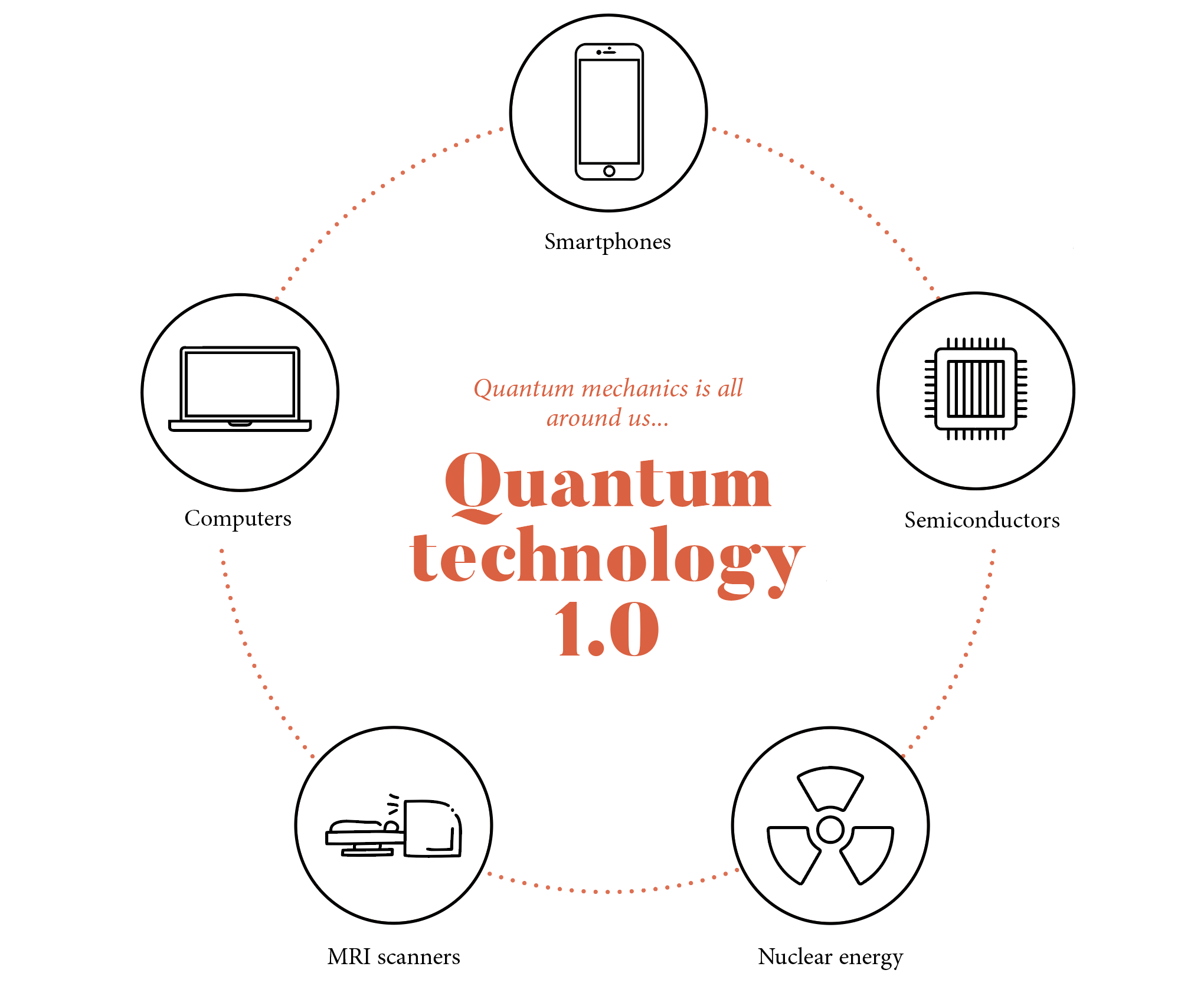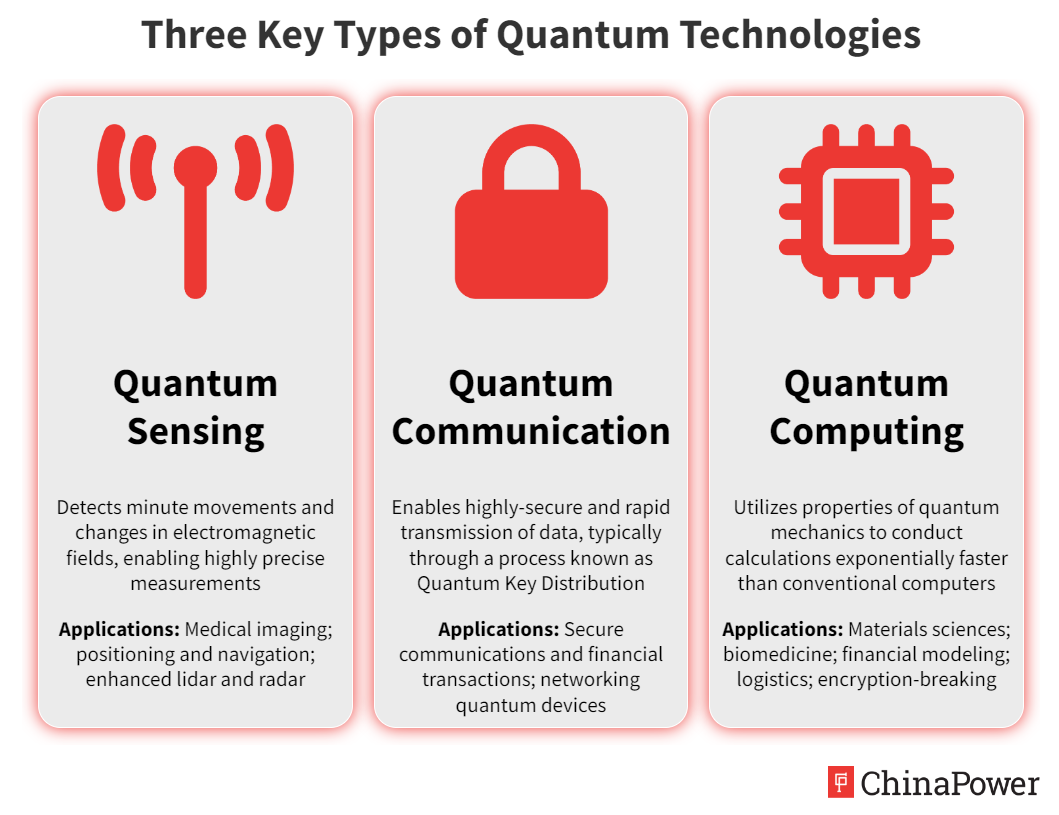Quantum technology is a fascinating field transforming our understanding of the universe. It leverages principles of quantum mechanics for innovative applications.
Quantum mechanics studies particles at the smallest scales, like electrons and photons. Quantum technology uses these principles to create advanced devices and systems. Unlike classical computing, which relies on bits, quantum computing uses quantum bits or qubits. This allows for exponentially faster processing.
Quantum technology isn’t just about computing. It includes communication, sensing, and cryptography too. Quantum communication promises ultra-secure data transfer. Quantum sensors can detect minute changes in physical properties. As this technology evolves, it holds the potential to revolutionize many industries. Understanding quantum technology is crucial for grasping the future of science and technology.

Credit: tu-delft.foleon.com
Introduction To Quantum Technology
Quantum technology is a new field of science and engineering. It uses the principles of quantum mechanics. Quantum mechanics is the theory that explains how the smallest particles in the universe behave. Quantum technology promises to revolutionize many areas like computing, communication, and sensing. It might change how we solve complex problems, secure our data, and measure the world around us.
Origins And History
The origins of quantum technology date back to the early 20th century. Scientists like Max Planck and Albert Einstein started the quantum revolution. They discovered that energy is not continuous. Instead, it comes in small packets called quanta. This discovery led to the development of quantum mechanics. In the mid-20th century, researchers began to explore practical applications of quantum theory. They developed technologies like the laser and the transistor. These inventions laid the groundwork for modern quantum technology.
Basic Principles
Quantum technology is based on several key principles of quantum mechanics:
- Superposition: A quantum system can exist in multiple states at once.
- Entanglement: Particles can become linked, and the state of one affects the state of the other, no matter the distance.
- Quantum Tunneling: Particles can pass through barriers that would be impossible in classical physics.
These principles are the building blocks of quantum technology. They enable the development of new devices and systems. Quantum computers use superposition to perform many calculations at once. Quantum communication uses entanglement to create secure communication channels. Quantum sensors use tunneling to detect very small changes in the environment.
Understanding these principles is essential to grasp the potential of quantum technology. It opens up a world of possibilities for innovation and advancement.

Credit: thequantuminsider.com
Key Components
Quantum technology is a field that combines quantum mechanics with practical applications. It promises innovations that can change many industries. Understanding its core components is essential. Let’s delve into some key elements that make quantum technology work.
Qubits And Quantum Gates
Qubits are the building blocks of quantum computers. Unlike classical bits, qubits can exist in multiple states at once. This property enables quantum computers to process information much faster. Quantum gates manipulate qubits. They perform operations to solve complex problems. Together, qubits and quantum gates create the foundation of quantum computing.
Quantum Entanglement
Quantum entanglement is a unique phenomenon. It links two particles in such a way that the state of one affects the other, no matter the distance. This property is crucial for quantum communication. It ensures secure transmission of information. Quantum entanglement also plays a role in quantum computing. It allows qubits to work together, enhancing computational power.
Quantum Computing
Quantum computing is a groundbreaking advancement in technology. It leverages the principles of quantum mechanics to solve complex problems. Unlike classical computers, which use bits, quantum computers use quantum bits or qubits. This allows them to process information in ways that classical computers cannot.
How It Works
Quantum computing relies on the unique properties of qubits. These properties include superposition and entanglement. Superposition allows qubits to exist in multiple states simultaneously. This means a qubit can be both 0 and 1 at the same time. Entanglement enables qubits to be interconnected, so the state of one qubit affects the state of another, even if they are far apart.
Classical computers use binary logic. They process data as a series of 0s and 1s. Quantum computers, on the other hand, process data in parallel. This allows them to solve complex problems much faster. For example, a quantum computer can factor large numbers in seconds. A classical computer would take years.
Potential Applications
Quantum computing has the potential to transform many industries. Here are a few examples:
- Cryptography: Quantum computers can break current encryption methods. This will lead to new, more secure encryption technologies.
- Medicine: They can simulate molecular interactions. This helps in drug discovery and development.
- Artificial Intelligence: Quantum computers can process vast amounts of data quickly. This improves machine learning algorithms and AI performance.
- Logistics: They optimize routes and schedules for transportation and supply chains.
Quantum computing is still in its early stages. But its potential is enormous. As the technology matures, it will open new possibilities. Industries will benefit from faster, more efficient solutions.
Quantum Communication
Quantum communication represents a groundbreaking field within quantum technology. It leverages the principles of quantum mechanics to transmit information securely. Traditional communication methods face increasing risks of data breaches. Quantum communication offers a potential solution to these issues.
Quantum Cryptography
Quantum cryptography involves using quantum mechanics to encrypt messages. It ensures only the intended recipient can read the message. One key aspect is Quantum Key Distribution (QKD). QKD uses quantum bits, or qubits, to create a secure key. Any attempt to intercept the key changes its state. This alerts the communicating parties to the eavesdropping attempt.
Secure Data Transmission
Quantum communication promises highly secure data transmission. Traditional encryption methods rely on complex algorithms. These algorithms can eventually be cracked with enough computational power. Quantum communication, in contrast, relies on the laws of physics. These laws make it virtually impossible to intercept or decode the information without detection.
This technology enhances the security of sensitive data. Applications include government communications, financial transactions, and personal privacy. In a world where data security is paramount, quantum communication stands out. It offers a robust solution to protect information.
Quantum Sensing
Quantum sensing uses the principles of quantum technology to measure physical quantities with high precision. This technology improves the accuracy of sensors in various fields, such as medical imaging and navigation systems.
Quantum sensing uses quantum mechanics to improve measurement accuracy. It taps into the unique properties of quantum particles. This technology offers precision that classical methods cannot achieve.Enhanced Measurement Techniques
Quantum sensing enhances the way we measure things. Traditional sensors often face limitations. Quantum sensors use entanglement and superposition. These properties allow for more precise and sensitive measurements. They can detect even the smallest changes. This makes them superior in many fields.Real-world Examples
Quantum sensing has practical applications. One example is in medical imaging. Quantum sensors can detect disease markers early. This leads to better treatment outcomes. Another example is in navigation. Quantum sensors improve GPS accuracy. This is useful for autonomous vehicles. They also help in earthquake detection. Quantum sensors can detect tiny ground movements. This allows for early warning systems. These examples show the potential of quantum sensing. “`
Credit: chinapower.csis.org
Impact On Industries
Quantum technology transforms industries by enhancing computational power, enabling precise simulations, and improving data security. It impacts healthcare, finance, and manufacturing significantly.
Quantum technology is transforming various industries, offering unprecedented advancements. This technology leverages quantum mechanics principles to solve complex problems efficiently. Let’s explore its impact on specific industries.Healthcare Innovations
Quantum technology is revolutionizing healthcare. It enables faster drug discovery by simulating molecular interactions. Researchers can identify potential treatments more quickly. This reduces the time needed for clinical trials.Medical imaging benefits too. Quantum sensors provide higher precision. They detect diseases at early stages, improving patient outcomes. Quantum computing also enhances genetic research. It helps decode complex genetic information faster.Advancements In Ai
Quantum technology significantly boosts artificial intelligence capabilities. Quantum computers process vast datasets swiftly. This leads to more accurate AI predictions and decisions. Machine learning models train faster, improving efficiency.Quantum algorithms enhance AI problem-solving skills. They solve optimization problems better. This benefits industries like finance, logistics, and manufacturing. Improved AI can predict market trends more accurately, optimize supply chains, and enhance production processes.Quantum technology’s impact on industries is profound. It drives innovation and efficiency across various sectors. Embracing this technology promises significant advancements and improvements.Challenges And Limitations
Quantum technology promises many groundbreaking advancements. Yet, it faces many challenges and limitations. These hurdles range from technical issues to ethical questions. Understanding these barriers is crucial for progress.
Technical Hurdles
Quantum technology relies on quantum bits, or qubits. They are unstable and prone to errors. Maintaining qubit stability is a significant challenge. Quantum systems also need extremely low temperatures to function. This makes them difficult and expensive to manage. Furthermore, quantum computing requires vast amounts of data. Processing this data is a complex task. Researchers are working to solve these technical problems. But, progress is slow and requires significant resources.
Ethical Considerations
Quantum technology raises important ethical questions. One concern is data security. Quantum computers could break current encryption methods. This could compromise sensitive information. There’s also the issue of digital privacy. With greater computing power, the potential for misuse increases. Ethical guidelines and regulations are necessary. These will help ensure the technology is used responsibly.
Another consideration is the impact on jobs. Quantum technology could automate many tasks. This might lead to job losses in certain sectors. Society needs to prepare for these changes. Training and education programs are essential. They can help workers adapt to new roles and opportunities.
Future Prospects
Quantum technology is not just a buzzword; it is a field that is rapidly evolving. The future prospects of quantum technology are vast and exciting. Imagine a world where computers solve complex problems in seconds. Or where communication is completely secure. These are just a few of the possibilities.
Ongoing Research
Researchers around the world are working on various aspects of quantum technology. There are many areas of focus.
- Quantum Computing: Scientists are developing quantum computers that can perform calculations much faster than current computers.
- Quantum Communication: This involves creating secure communication channels that cannot be hacked.
- Quantum Sensing: Researchers are building sensors that can detect minute changes in the environment.
These research areas are crucial for advancing quantum technology. They lay the groundwork for future applications.
Potential Breakthroughs
The potential breakthroughs in quantum technology are numerous. Here are some of the most promising areas.
| Area | Potential Breakthrough |
|---|---|
| Medicine | Faster drug discovery and personalized medicine. |
| Finance | Improved algorithms for financial modeling and risk management. |
| Artificial Intelligence | Enhancement of machine learning and AI capabilities. |
| Cryptography | Development of unbreakable encryption methods. |
These breakthroughs could change many industries. The impact of quantum technology could be significant. Society may benefit in numerous ways.
Frequently Asked Questions
What Is Quantum Technology?
Quantum technology leverages principles of quantum mechanics to develop advanced tools. These tools include quantum computing, quantum cryptography, and quantum sensing. It offers unprecedented capabilities in processing power, security, and precision.
How Does Quantum Computing Work?
Quantum computing uses quantum bits or qubits. Unlike classical bits, qubits can be in multiple states simultaneously. This allows quantum computers to solve complex problems faster than traditional computers.
Why Is Quantum Cryptography Important?
Quantum cryptography ensures ultra-secure communication. It uses quantum mechanics principles to encrypt data. Any attempt to eavesdrop on the communication changes the data, making it detectable.
What Are The Applications Of Quantum Sensors?
Quantum sensors provide extremely precise measurements. They are used in fields like medical imaging, navigation, and environmental monitoring. These sensors can detect minute changes in physical quantities.
Conclusion
Quantum technology holds great potential for the future. It offers advancements in computing, communication, and security. Understanding its basics helps us grasp its significance. As this field grows, staying informed becomes crucial. Embrace learning about quantum technology. It might shape tomorrow’s innovations.
Thank you for reading!










